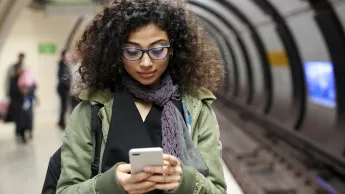How digitisation is expanding our language
- 2023-09-22
- Lisa Priller-Gebhardt
- Comment

The extent to which contemporary culture influences our language can be determined based on the likes of tweets, posts and remarks that are posted in their millions on a daily basis. What and how we communicate has dramatically altered due to social media channels. New word creations are constantly being added, which is why linguist and book author Gretchen McCulloch designates the use of language on the internet as ‘humanity’s greatest open source project’.
New slang words such as fail or safe and acronyms like OMG!, FYI, YOLO or LOL have become part of the rapid exchange of news. Style simultaneously softens towards the oral because real-time dialogue drives the pace of such exchange. Spelling rules and upper and lower case are ignored, as are full stops and commas. ‘These new channels are resulting in the use of a more formal standard language being forced into the background; exchange becomes less formal’, says Andreas Gardt, professor of German Studies at the University of Kassel. ‘Yet the important thing is that the content is understood, so one is tolerant of one's own mistakes’, Gardt says.
Does real time communication threaten language degradation?
Cultural pessimists already see language degradation. Gardt, as a linguistic expert and Chair of the Language Commission at the Deutsche Akademie für Sprache und Dichtung (German Academy for Language and Literature), doesn’t share this concern, because he feels that the traditional form would still exist. ‘The decisive aspect is that standard language continues to be taught in schools and different registers are mastered’, Gardt believes. Writers generally adapt their style to the reader and thus ensure appropriate, situation-related use of language. ‘Those who find the right wording for their different target groups are doing everything right’, the professor states.
The increasing use of digital communication is not only causing the conversational tone to be more informal in our private lives, but also in our professional environment. ‘Just 10 to 15 years ago, it would scarcely have been conceivable to write “Dear Mrs Meyer” to someone we didn’t know’, explains Gardt. Yet society's attitude has radically changed in the course of digitisation. Barely anyone nowadays who receives an email written in such familiar terms would be grievously offended.
New careers and phenomena expand our vocabulary
Technical inventions and additional platforms are at the same time enabling new, independent terms to find their way into our vocabulary. ‘Words like posting, tweeting or streaming are becoming integrated into our language and are expanding the German lexicon’, says Gardt, whose academic interest also currently involves the conceptualisations that AI and thus also ChatGPT introduce. ‘New sectors that are especially evident such as those concerned with IT technology introduce previously unknown professions, such as social influencer or AI engineer. And each sector has its own vocabulary. These often involve technical terms – some of which also become part of our daily vocabulary’, Gardt believes. They include copyright, privacy and globalisation. We conversely have more difficulty with words such as cloud, algorithm and data that are closely linked to digital transformation. We first have to learn their meaning before they become an active part of parlance’, says Gardt. And how long does it actually take until these new terms become established? ‘Duden or the Digitales Wörterbuch der Deutschen Sprache (DWDS – The Digital Dictionary of the German Language) has followed this aspect over a longer period of time. Words that are still in use after five or ten years then also make it into these reference works.’
